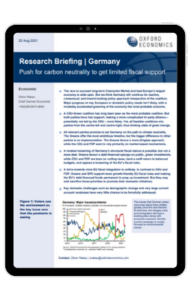Germany | Push for carbon neutrality to get limited fiscal support

The race to succeed long-term Chancellor Merkel and lead Europe’s largest economy is wide open. But we think Germany will continue its reactive, consensual, and inward-looking policy approach irrespective of the coalition. Major progress on key European or domestic policy needs isn’t likely, with a modestly accelerated greening of the economy the most probable outcome.
What you will learn:
- All relevant parties promise to set Germany on the path to climate neutrality. The Greens offer the most ambitious timeline, but the bigger difference to other parties is on implementation. The Greens favour a more dirigiste approach, while the CDU and FDP want to rely primarily on market-based mechanisms.
- A modest loosening of Germany’s structural fiscal stance is possible, but not a done deal. Greens favour a debt-financed splurge on public, green investments, while CDU and FDP are keen on cutting taxes, back a swift return to balanced budgets, and oppose a loosening of the EU’s fiscal rules.
- A drive towards more EU fiscal integration is unlikely. In contrast to CDU and FDP, Greens and SPD support more growth-friendly EU fiscal rules and making the EU’s debt-financed funds permanent to prop up investment. But they may well sacrifice those priorities to promote their domestic initiatives.
Tags:
Related Services

Post
House prices continue to slide for China’s cities
Research Briefing Germany | Push for carbon neutrality to get limited fiscal support While the property market downturn has been universal, the scale and depth has been varied for different cities and regions.
Find Out More
Post
The Construction Productivity Challenge in Australia
Delve into the state of construction productivity in Australia. Understand the factors affecting growth and how innovation can transform the industry for the better.
Find Out More